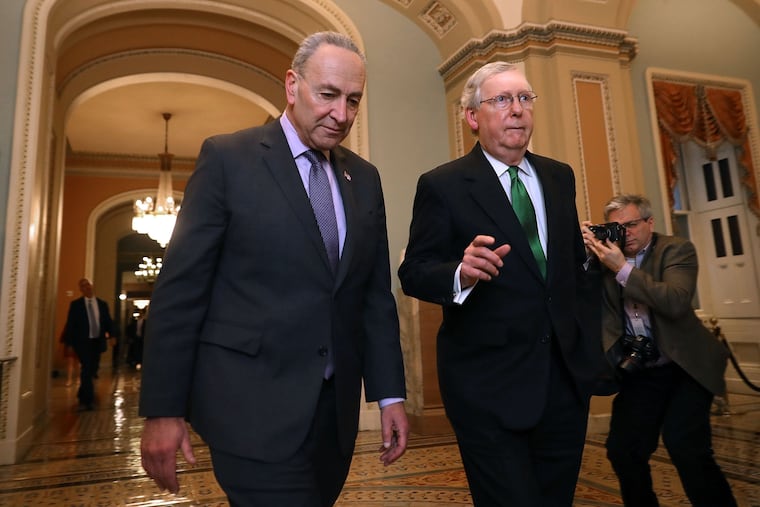McConnell relents on Senate filibuster rules, signals power-sharing deal with Democrats
The Senate minority leader had originally signaled that he would not agree to an arrangement in the 50-50 Senate unless Democrats agreed to preserve the filibuster.

WASHINGTON — Senate Minority Leader Mitch McConnell on Monday night signaled that he would step back from an ultimatum over Senate rules that sparked a partisan showdown that threatened to obstruct President Joe Biden’s early legislative agenda.
McConnell, R-Ky., said in a statement that he was ready to move forward with a power-sharing accord with Democrats on how to operate the evenly divided Senate, defusing a potentially explosive clash over the minority’s rights to block legislation.
At issue for McConnell was the fate of the filibuster, the Senate rule that acts as a 60-vote supermajority requirement for most legislation. With many Democrats calling for its elimination as their party takes control of the House, Senate, and White House, McConnell had sought assurances from the new Senate majority leader, Sen. Chuck Schumer, D-N.Y., that the filibuster would be preserved.
Democrats bristled at the request, demanding that McConnell agree to a power-sharing arrangement that followed the model used during the last 50-50 Senate, in 2001 — which would give the party with the vice presidency and its tie-breaking powers control of the floor agenda without additional provisions.
Without the deal in place, Senate committees were frozen in place from the previous Congress, in which Republicans held a majority. That created the unusual circumstance in which Democrats have control of the floor while GOP chairmen remained in charge of most committees.
McConnell on Monday said he was prepared to move forward on a deal “modeled on that [2001] precedent” after two Democratic senators — Joe Manchin of West Virginia and Kyrsten Sinema of Arizona — publicly reiterated their previously stated opposition to eliminating the filibuster.
“They agree with President Biden’s and my view that no Senate majority should destroy the right of future minorities of both parties to help shape legislation,” he said.
» READ MORE: Trump impeachment goes to Senate, testing his sway over GOP
Biden said in July that he’d “take a look” at eliminating the filibuster if Republicans became overly “obstreperous” but has otherwise been respectful of the traditions of the Senate, where he spent six terms before becoming vice president in 2009.
White House press secretary Jen Psaki indicated Friday that Biden intends to keep seeking to work with Republicans and has no plans to change his views on Senate rules.
Manchin and Sinema had spoken out in favor of retaining the filibuster, so Democrats do not view their recent statements as a significant concession. But McConnell made his point: The retention of the filibuster is a divisive issue for Democrats — one that probably would suffuse their efforts to advance Biden’s agenda through a narrowly divided Congress.
Manchin told reporters Monday that killing the filibuster would run against Biden’s goal of uniting the country: “We’ve got to come together, so I do not support doing away with the filibuster under any condition. It’s not who I am.”
A spokeswoman for Sinema said Monday that she is “against eliminating the filibuster, and she is not open to changing her mind about eliminating the filibuster.”
It could be months before the issue again comes to a head. Biden’s first legislative priority is passing a $1.9 trillion pandemic relief bill, and he is seeking Republican support to pass it without sidestepping the normal legislative process. Should the GOP balk, however, Democrats are preparing to employ special budgetary procedures known as reconciliation that can skirt the 60-vote requirement.
Other major Democratic agenda items, however, cannot be passed using reconciliation — including civil rights expansions, climate legislation, police policy changes and other issues that are not directly related to the federal budget. To advance those priorities, liberal activists are preparing to target the Democratic senators who have been reluctant to consider undoing the filibuster.
» READ MORE: Pa. congressman Scott Perry acknowledges introducing Trump to lawyer at the center of election plot
“We cannot let all our hard work go to waste because of this racist, outdated, and undemocratic procedure,” said activist Liz Haskell of Yuma County Indivisible, a group that helped elect Sinema in 2018. “If Senator Sinema wants to deliver for the people who pulled her across the finish line, she’s got to be a strong advocate for getting rid of the filibuster in the Senate.”
While many Democrats have long anticipated an internal showdown should they win the majority, most were shocked that McConnell would raise the issue so quickly after moving from majority to minority leader. The structure of Senate operations is laid out in a resolution that is subject to the filibuster itself, which gave McConnell leverage to make his demands.
McConnell’s statement Monday came as Schumer reiterated his own determination not to bow to the longtime Republican leader’s demands.
“He is not majority leader. He is the minority leader, and he is not going to get his way,” Schumer said in an MSNBC interview Monday. “We are not going to do what he wants. … We hope in the next day or two he will come to his senses and take our offer.”
Justin Goodman, a spokesman for Schumer, said Democrats were “glad Senator McConnell threw in the towel and gave up on his ridiculous demand.”
“We look forward to organizing the Senate under Democratic control and start getting big, bold things done for the American people,” he said.